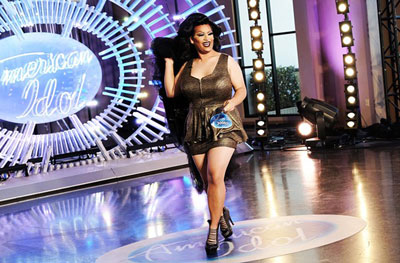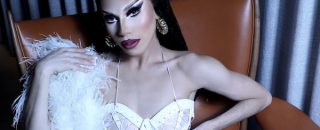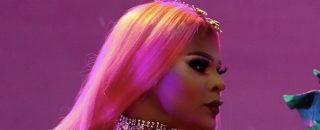Originally published in the San Antonio Current.
To most American Idol viewers, the singing drag queen Ada Vox came out of nowhere to turn in one stunning prime-time performance after another. Vox grabbed our attention early on with an incandescent rendition of Radiohead’s “Creep,” and she didn’t let go.
Vox followed up with her interpretation of Nina Simone’s “Feeling Good,” which brought judge Katy Perry to her knees. “You’ve heard the expression ‘wig snatched’?” she asked as Vox flipped her enormous ponytail to one side. “Wig flew,” Perry said.
Vox’s numbers and costume choices became more refined as the competition progressed. One evening, she strolled out in a shimmering, raven-like ensemble of black feathers, silver fringe and rhinestones – fit for the likes of Diana Ross. She then decimated her audience with “The Show Must Go On” by the iconic gay-fronted rock group Queen. “I can’t even tell you how proud I am of you,” judge Lionel Richie said to her that week. “And each time you come, you take us to another level, and I am going to be right here to make sure I see you reach the top. You are on fire, my dear, on fire.”
On the night she was eliminated, April 29, Vox sang The Lion King’s “The Circle of Life,” donning another decadent ensemble – gold chains that matched her hair, which flowed like Mufasa’s mane.
Vox, the first drag queen in the show’s 16-year history, exposed millions of uninitiated Americans to the art of drag.
But fans of San Antonio’s drag scene knew Vox from way back – or thought they did.
Born Adam Sanders in San Antonio in 1993, he grew up singing. His connection to music, however, intensified when his mother sang to him in the hospital when Sanders was recovering from the removal of a cyst that had developed on his brain stem when he was eight years old. Sanders graduated from South San High School and attended UTSA briefly as a music-performance major – he played the clarinet – before leaving school.
His reason for dropping out: getting on American Idol the first time, in season 12 – as Adam Sanders, not yet Ada Vox. The singer made it on the show after wowing then-celebrity judges Nicki Minaj, Keith Urban, Mariah Carey and Randy Jackson with “I’d Rather Go Blind” by Etta James. But the performer didn’t survive the notoriously grueling rounds of Hollywood Week, and was sent home early.
Performing at San Antonio Pride in 2013, following his brief turn on Idol, Sanders saw drag queens in their element for the first time, and he decided to join them. But he would introduce live singing to the art form. Two years later, Sanders had developed the drag persona Ada Vox, and competed in the Drag Me to Fame competition as well as late-night karaoke competitions at Mama Margie’s.
In October 2017 at the San Antonio tryouts for the current season of American Idol, Sanders auditioned for the 13th time.
Few would have predicted the success of Ada Vox, who’s had her share of critics in San Antonio. They said she lacked polish, that she had an awkward stage presence. Yet her run on Idol, which ended with Vox in the top 10, has made her the highest-profile product of a San Antonio drag tradition that goes back decades.
Vox emerged from a scene that has pulsed with energy – with drag performers eager to snatch a title at Talent Night at the old Paper Moon in the 1980s, the Haus of Andrews Pageant and today’s Drag Me to Fame competition hosted by Rey Lopez, who routinely brings touring drag stars to town.
Until recently, fans have had to venture to gay bars such as the Heat to watch a drag queen perform. But drag is going mainstream, and Vox’s success is the latest evidence.
In 2009, RuPaul Andre Charles launched the show RuPaul’s Drag Race, in which drag queens from all over the United States compete in a Project Runway-meets-America’s Next Top Model-type showdown. The show has beamed drag and LGBTQ culture into the homes of Middle America, building on the success of the VH1 series The RuPaul Show, which started in 1996 and broke open a once-underground genre. Last year, RPDR moved from the niche network Logo to VH1, which has given the show much broader visibility.
But Ada Vox wasn’t a star on a show featuring drag queens. She performed on a show that was once on Fox and has traditionally had a conservative fan base and viewership. For six weeks, Idol fans tried to get their heads around a gay man in a dress … who can sing. And as it turned out, nearly three decades after the release of Paris Is Burning, a documentary that chronicled the mid-to-late 1980s Harlem ball culture in New York City (and the black, Latino, gay, drag queen and transgender communities involved in it), a lot of Americans still have issues with a man in women’s clothes.
For nearly two months, American Idol viewers either endured or welcomed a drag queen on stage for the first time in the show’s history.
Vexed Viewers
During its fifth season, Fox’s American Idol roared along as television’s most-watched show, with an average of 31.7 million viewers, The New York Times reported in 2006. Season five would remain the show’s highest rated. According to TVLine.com, ABC’s American Idol revival attracted 10.3 million viewers, nearly on par with its final season on Fox (9.3 million viewers). Last week, the show hit around 7.6 million viewers. By contrast, Drag Race reached about 700,000.
Idol viewers twice voted Vox off the show. The first time, the celebrity judges, including singers Richie and Perry, stepped in to save Vox from elimination. But they couldn’t intervene a second time. While many of the show’s fans sang Vox’s praises, numerous posts on American Idol’s social media made it clear that some viewers rejected the very idea of a drag queen in the competition.
Don Smith wrote: “Im done w AI. FINISHED. If you can’t respect the vote of the American people. This is not lesbian Idol or trans Idol or racial Idol this is American Idol and the vote of the watching audience should count. If they cannot get the votes, they sadly have to go home like everyone else.”
Lacy Olivia Toney posted: “You can’t be a man in the interviews and a woman on stage…THIS IS NOT A DRAG QUEEN SHOW.”
Keith Howell wrote: “How are the judges and ABC going to save HIM next week after America says we don’t want you.”
Nevertheless, Vox said her elimination may not have resulted solely from her being a drag queen, that perhaps the majority of Idol viewers preferred the other contestants’ styles to her own.
“I’m not entirely sure what exactly had impact on votes,” Vox said last week as she waited for a flight out of Los Angeles International Airport. “Although it seems that it was some type of way based on minorities being in the bottom. I just can’t say. We also may not have been everybody’s cup of tea, vocally, you now? And that just may have been what it was.”
Vox, who performed at Luther’s Café, the Heat and other venues before rising to American Idol fame, also said every contestant gave it their all. “I know that all of us got up there, and we did the best that we could no matter what people told us,” she said. “No matter how many people said, ‘You’re a drag queen. You’re not going to make it,’ you know?”
Dr. Stacy Speedlin, a visiting professor at UTSA, clinical practitioner at the Center for Healthcare Services and a member of the LGBTQ community, takes a more critical view of Vox’s experience on American Idol. She sees it as evidence that the culture hasn’t caught up yet with the queens.
“I think for so long, historically, people have often negotiated their own identity in order to get opportunities like the one Ada Vox had – not just as an LGBTQ-identified person but also as a person of color,” Speedlin said. “The message has always been delivered [that] if you want to be successful, you have to be able to fit yourself into mainstream – not to ask the mainstream to accept us and to receive us the way we present. My hope is that we will one day reach a place where, when people see someone like Ada on TV, they can really see her. They don’t just see the demographic, because the conversation shifts more to her demographic than it does to her talent.”
An Uneasy Fit
This wasn’t the first time Vox struggled for acceptance.
Julián P. Ledezma, who is a judge for Drag Me to Fame and has been photographing drag queens in San Antonio for more than a decade, described Ada Vox as the black sheep of the San Antonio drag family. She was bullied by other drag queens, he said, for not having spot-on makeup and performance attire.
“The first time I ever heard of Ada was when she competed in Drag Me to Fame,” said Ledezma, adding that Vox didn’t come close to winning the two or three times she competed. “She [wasn’t] as polished as everyone else, so [the other drag queens] attacked her for that. And I kept on reminding her, ‘They’re attacking you because they know you have something that they don’t have (her vocal skills), and if you quit, then it’s just better for them.’ As a judge, I would get my time to talk with her, and my advice to her was: ‘You have something that no other drag queen has, and they’re all shaking right now because you’re implementing right now what we’ve all wanted to see, which is a singing drag queen.’
“I’m so happy and it brings me to tears that she’s doing what she’s doing because she’s totally breaking the mold,” Ledezma added. “She broke the glass ceiling of a drag queen on American Idol.”
Ledezma said a lot of members of San Antonio’s drag community, including himself, thought it would be RuPaul’s Drag Race that would help put an Alamo City drag queen on the map – possibility a Rey Lopez showgirl. Ada Vox upended that assumption when she sang her way into Idol’s top 10.
“We all got a curve ball with Ada Vox,” Ledezma said. “She didn’t win but she won. It’s just like when you make it to RuPaul’s Drag Race, and you don’t win – well, you won, girl, because you’re Miss Vanjie (the first queen to be eliminated on season 10 of RuPaul’s Drag Race, who made a memorable exit from the show). Girl, you made it.”
Despite the shade thrown at Ada, local drag performer Brian Hernandez, better known as Miss Taint, has been a vocal supporter of the singing siren from the South Side. Hernandez graced the cover of the Current last year as one of the leaders of San Antonio’s new school of drag. After Vox’s elimination from Idol, Hernandez said in a Facebook post: “The most excellent way to sign off – you came and conquered Ada Vox, from seeing you at talent shows in high school and killin it at karaoke mama Margie nights, to where I’m seeing you now – I’m extremely proud of all that you’ve done and will continue doing. SLAY”
But Hernandez wasn’t the only drag queen to lend support. RuPaul’s Drag Race queens Adore Delano, Shangela and even RuPaul herself took to social media to show support to Vox, with RuPaul saying “SHANTAY, you slay! @AdaVox XORU”
“I think the incredible part about Ada is that it’s not about just the drag, it’s her talent. It’s talent first,” Airline Inthyrath told the Current from his home in Boston. Inthyrath, better known as JuJuBee from RuPaul’s Drag Race season two, who finished in the top three that season and was featured on RuPaul’s Drag U as well as the first season of RuPaul’s Drag Race All Stars. “The truth of the matter is that now she’s this drag persona, and this character that she’s providing us with. For all of us that already love her for who she is, we’re gonna follow her no matter what.”
Inthyrath said Vox’s visibility as a drag queen who can sing is important to the young LGBTQ person out there who’s questioning who and what they want to be when they grow up.
“This, to me, is history. Or HERstory if we could put it that way,” Inthyrath said. “Because imagine being a child watching [Ada Vox on American Idol] and feeling like you’re so lost and you don’t know what you’re going to do when you get older because you know you’re different. And I know that our community has been so out there in the past decade as far as entertainment and mainstream – like Drag Race has become mainstream, and that’s crazy in itself. And I think it’s incredible, and with Ada being on this platform and this stage and using her voice to sing, she’s now allowed to show the world that if you reach for the stars, you can get there. You really can do anything you want. Anything is possible, and I think that’s just fucking greatness. She’s like a gay messiah.”
Days after her elimination from American Idol, we caught up with Vox, who was heading to Corpus to spend time with family before returning to Los Angeles to start recording music and plan a tour for later this year, essentially plotting her post-Idol career.
You’re famous now, girl. What’s happening next for you?
I’m working with some great people. Honestly, I’m working with a great songwriter who I’m going to be doing some stuff with. I also write my own music, so the studio is definitely going to be happening in the near future. I do have a couple of things already recorded that I’m going to be touching up and recording as well to release very soon. With the booking agent, he’s absolutely fantastic, and we are working on a bunch of dates. I think I’m going to be clear across the U.S. between the months of June and August, so that’s gonna be really fun. We’re working on some Canada dates as well. We already have two or three Canada dates confirmed. My plan is to make sure that I stay relevant. I want to make sure that I keep my name in people’s minds, and I’m going to do that by making sure that I actually get to connect with my fans on a personal level so that we can all experience the love that they can give me and that I can give them from the stage.
Any plans with RuPaul’s queens?
I don’t have anything confirmed. There’s a bunch of them that I’ve talked to that are big supporters of me. And you know I’ve been big fans of theirs for years since they came out on Drag Race. I greatly admire those queens that have the work ethic ’cause you have to have the work ethic to remain relevant nowadays. And, you know, I would really love to, with the music queens, go ahead get some tracks done, do some features with them, have them on my stuff. I think queens helping queens is always a good thing.
Who do you want to work with out of the music queens?
I think JuJuBee would be a lot of fun to work with, even if I could just have her come out and do a little rap on our track, that would be fun!
What would you say to the other LGBTQ children of San Antonio who are musicians who are seeing you and want to be in a position like yours, or who want to just pursue music and their passion as a career?
This has been a long, long time in the works for me. I’ve auditioned for the show for a total of eight years and a total of 13 times in different cities and states, and persistence definitely pays off. I think that’s something we can all learn from. Never to give up because the second you give up is the second you know nothing’s ever gonna happen. That’s the only way you can guarantee failure. By giving up.








